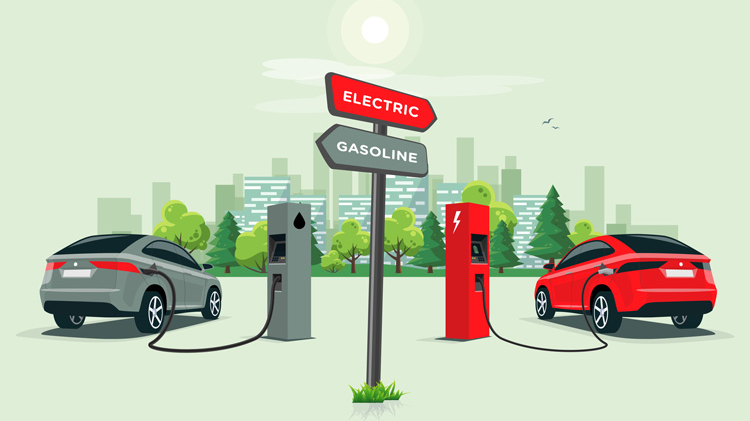Electric Vehicles the Future of The Automotive Industry

Electric vehicles (EVs) are expected to play a major role in the future of the automotive industry. The growing concern for the environment and the need to reduce carbon emissions are driving the demand for EVs, which produce zero or low emissions compared to conventional gasoline-powered vehicles. Additionally, advancements in battery technology and charging infrastructure are making EVs more practical and accessible for consumers. Governments around the world are also offering incentives and subsidies to encourage the adoption of EVs. As a result, many automakers are investing heavily in electric vehicle technology and production.
What are electric vehicles?
Electric vehicles (EVs) are vehicles that are powered by electric motors and batteries instead of traditional fuel-powered engines. They can be either fully electric or hybrid electric vehicles, which combine an electric motor with a conventional gasoline engine. EVs are environmentally friendly and produce no emissions, making them a popular alternative to conventional vehicles. Examples of electric vehicles include electric cars, electric motorcycles, electric scooters, and electric bicycles.
Need for electric vehicles
There are several reasons for the increasing need for electric vehicles (EVs), including:
- Environmental sustainability: EVs produce significantly lower emissions compared to traditional gasoline-powered vehicles, reducing air pollution and contributing to a cleaner environment.
- Energy independence: EVs rely on electricity, which can be generated from a variety of domestic sources, reducing dependence on foreign oil.
- Cost savings: The operating costs of EVs, such as charging and maintenance, are typically lower than those of traditional vehicles.
- Improved driving experience: EVs are often quieter and smoother to drive, with instant torque and responsive acceleration.
- Government incentives: Governments around the world are offering tax credits, subsidies, and other incentives to encourage the adoption of EVs to meet emissions reduction targets.
The combination of environmental, economic, and performance benefits is driving the increasing demand for EVs.
Pros of electric vehicles
- Lower operating costs: EVs typically have lower fuel and maintenance costs compared to gasoline vehicles.
- Environmentally friendly: EVs produce zero tailpipe emissions, leading to reduced air pollution and greenhouse gas emissions.
- Improved performance: Many EVs have quick acceleration and provide a smooth, quiet driving experience.
- Government incentives: Many countries offer tax credits and other incentives to encourage the purchase of EVs.
Cons of electric vehicles
- Most EVs have a limited range compared to gasoline vehicles, and long-distance travel may require multiple stops to recharge
- High upfront cost: Despite lower operating costs, EVs tend to have a higher upfront cost compared to equivalent gasoline vehicles.
- Charging infrastructure: While charging infrastructure is improving, it can still be difficult to find a charging station when needed, especially in rural areas.
- Battery degradation: Over time, the battery in an EV may degrade, reducing its range and potentially requiring a costly replacement.
Also Read : How Self Driven Car Will Change The World
Challenges to Electric Vehicles
Electric cars face several challenges:
- Range Anxiety: One of the biggest challenges is the limited driving range of electric cars compared to conventional gasoline vehicles.
- Charging Infrastructure: A lack of charging infrastructure is a major barrier to the widespread adoption of electric cars.
- Cost: Electric cars are still more expensive to purchase than their gasoline counterparts, although the cost is decreasing over time.
- Battery Performance: Battery performance in cold temperatures and the time it takes to charge the battery is still challenges for electric car manufacturers.
- Limited Model Availability: There are still limited options available for consumers when it comes to purchasing an electric car.
Future of Electric cars
The future of electric cars looks promising with continued advancements in technology and increasing demand for more sustainable transportation options. Some of the trends and developments in the future of electric cars include:
- Improving Battery Technology: With advancements in battery technology, the driving range of electric cars is expected to increase and charging time will decrease.
- Widespread Adoption: Electric cars are expected to become more widespread as countries adopt stricter emissions regulations and offer incentives for electric vehicle ownership.
- Increased Model Availability: The number of electric car models available on the market is expected to grow as more automakers enter the electric vehicle market.
- Charging Infrastructure: The charging infrastructure is expected to expand and improve to support the increasing number of electric cars on the road.
- Cost Reduction: The cost of electric cars is expected to decrease over time as the technology becomes more advanced and production processes become more efficient.
- Autonomous Technology: Electric cars are expected to increasingly adopt autonomous technology, allowing for improved safety and convenience for drivers.
How Electric cars are becoming the future of the automobile industry?
Electric cars are becoming the future of the automobile industry for several reasons:
- Environmental Benefits: Electric cars produce significantly fewer emissions compared to traditional gasoline vehicles, making them a more environmentally friendly option.
- Cost Savings: While electric cars currently have a higher upfront cost, they are cheaper to operate and maintain over the long term.
- Governments around the world are offering incentives and subsidies for electric vehicle ownership and implementing stricter emissions regulations, encouraging the growth of the electric car market.
- Advances in Technology: The technology behind electric cars continues to improve, with longer driving ranges, faster charging times, and better battery performance.
- Consumer Demand: There is growing consumer demand for more sustainable and environmentally friendly transportation options.
In conclusion, electric vehicles play an important part in the growth of the automotive industry.
